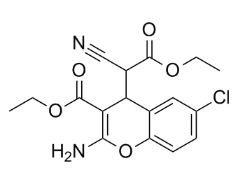All AbMole products are for research use only, cannot be used for human consumption.

SC79 is a specific and BBB permeable Akt activator used to enhance Akt activity. SC79 activates Akt in the cytosol and inhibits Akt membrane translocation. SC79 specifically binds to the PH domain of Akt. SC79 suppresses PHAKTM-GFP plasma membrane translocation, and enhances phosphorylation of all three Akt isoforms in HEK293, HeLa, HL60, NB4, and HsSulton (B cells) cells. SC79 augmentes Akt phosphorylation at both the Thr308 and S473 sites. SC79 reduces neuronal excitotoxicity and prevents stroke-induced neuronal death.
SC79 (0.04 mg/g, i.p.) enables the cytosolic activation of Akt, and recapitulates the primary cellular function of Akt signaling in the permanent focal cerebral ischemia mouse model, resulting in augmented neuronal survival.
*The compound is unstable in solutions, freshly prepared is recommended

Discov Oncol. 2025 Jun 17;16(1):1129.
RRP9 promotes prostate cancer metastasis and epithelial-mesenchymal transition through activation of the AKT/GSK3β/β-Catenin signaling pathway
SC79 purchased from AbMole

Cell Death Discov. 2024 Aug 29;10(1):389.
CTDSPL2 promotes the progression of non-small lung cancer through PI3K/AKT signaling via JAK1
SC79 purchased from AbMole

Antioxidants (Basel). 2023 Feb 9;12(2):434.
Non-Esterified Fatty Acid-Induced Apoptosis in Bovine Granulosa Cells via ROS-Activated PI3K/AKT/FoxO1 Pathway
SC79 purchased from AbMole

J Ethnopharmacol. 2022 Nov 15;298:115637.
Qingfei oral liquid alleviates RSV-induced lung inflammation by promoting fatty-acid-dependent M1/M2 macrophage polarization via the Akt signaling pathway
SC79 purchased from AbMole
| Cell Experiment | |
|---|---|
| Cell lines | HsSulton and NB4 cells |
| Preparation method | HsSulton or NB4 cells (2.5 × 105) are plated in a 24-well plate in 500 μL of phenol red-free RPMI medium supplemented with 10% FBS. After incubation for 24 hours, each compound (8 µg/mL) is added and cultured for overnight (16–20 h). Fifty microliters of MTT solution (5 mg/mL in PBS) are added to each well. Following 2 hrs incubation, the purple formazan crystals are dissolved by directly adding in 500 μL of isopropanol with 0.1 M HCl to each well. After clearing the cell debris by centrifugation, the absorbance is measured at a wavelength of 570 nm. |
| Concentrations | 8 μg/mL |
| Incubation time | 24 h |
| Animal Experiment | |
|---|---|
| Animal models | Permanent focal cerebral ischemia mouse model |
| Formulation | - |
| Dosages | 0.04 mg/g |
| Administration | i.p. |
| Molecular Weight | 364.78 |
| Formula | C17H17ClN2O5 |
| CAS Number | 305834-79-1 |
| Solubility (25°C) | DMSO 80 mg/mL |
| Storage |
Powder -20°C 3 years ; 4°C 2 years In solvent -80°C 6 months ; -20°C 1 month |
| Related Akt Products |
|---|
| ZINC00784494
ZINC00784494 is a specific Lipocalin-2 (LCN2) inhibitor. ZINC00784494 inhibits cell proliferation, cell viability and reduces AKT phosphorylation levels in SUM149 cells. |
| (E)-Akt inhibitor-IV
(E)-Akt inhibitor-IV is a PI3K-Akt inhibitor, with potent cytotoxic. |
| K-80003
K-80003 is a potent inhibitor of tRXRα-dependent Akt activation and cancer cell growth. |
| FPA-124
FPA-124, a cell-permeable copper complex, is a selective Akt inhibitor with an IC50 of 0.1 μM. |
| SPOP-IN-1
SPOP-IN-1 is a selective SPOP E3 ubiquitin ligase inhibitor. |
All AbMole products are for research use only, cannot be used for human consumption or veterinary use. We do not provide products or services to individuals. Please comply with the intended use and do not use AbMole products for any other purpose.


Products are for research use only. Not for human use. We do not sell to patients.
© Copyright 2010-2024 AbMole BioScience. All Rights Reserved.
